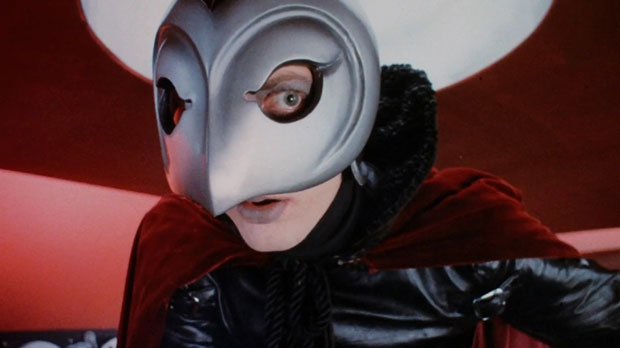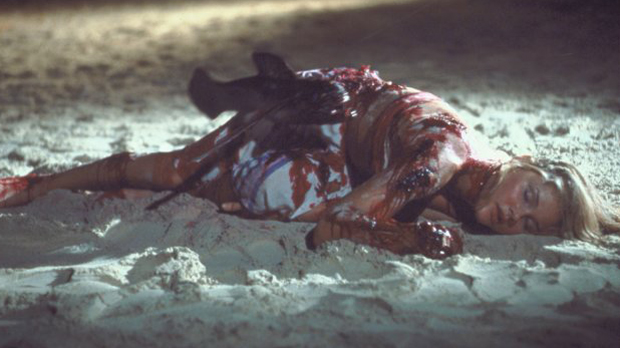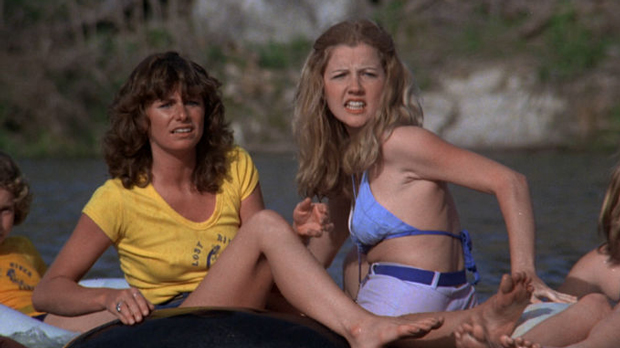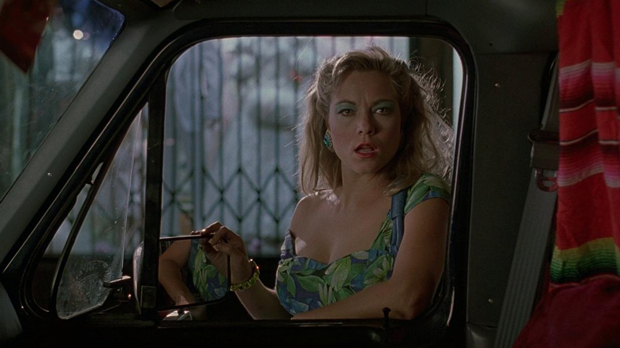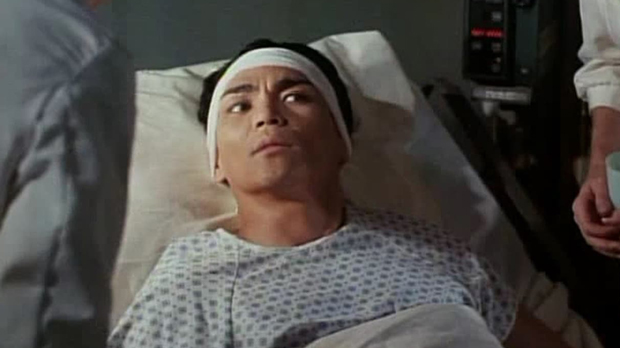 Phantom of the Paradise (1974) 20th Century Fox/Musical-Comedy-Horror RT: 91 minutes Rated PG (violence, bloody images, sensuality, language, drug content) Director: Brian De Palma Screenplay: Brian De Palma Music: Paul Williams Cinematography: Larry Pizer Release date: October 31, 1974 (US) Cast: William Finley, Paul Williams, Jessica Harper, Gerrit Graham, George Memmoli, Archie Hahn, Jeffrey Comanor, Peter Elbling. Box Office: N/A
Phantom of the Paradise (1974) 20th Century Fox/Musical-Comedy-Horror RT: 91 minutes Rated PG (violence, bloody images, sensuality, language, drug content) Director: Brian De Palma Screenplay: Brian De Palma Music: Paul Williams Cinematography: Larry Pizer Release date: October 31, 1974 (US) Cast: William Finley, Paul Williams, Jessica Harper, Gerrit Graham, George Memmoli, Archie Hahn, Jeffrey Comanor, Peter Elbling. Box Office: N/A
Rating: ***
Like The Rocky Horror Picture Show (released a year later), Phantom of the Paradise failed to find an audience during its initial release. Mainstream audiences didn’t know how to respond to this campy, comical, glam-rock take on The Phantom of the Opera. Critics weren’t too kind either. Oddly enough, it received an Academy Award nomination for its score (it lost to The Great Gatsby). It eventually achieved cult status and the love it richly deserves.
I discovered Phantom of the Paradise in an odd way. There was this vintage record shop (Plastic Fantastic in Ardmore, PA) I used to frequent in the late 80s/early 90s. I loved browsing through the stacks looking for something cool to add to my collection. While looking through the soundtracks, I came across Phantom of the Paradise. It must have been ’89. I never heard of the movie before but it looked like it was right up my alley. Don’t forget, I’m a card-carrying member of the Rocky Horror cult. A week or so later, I rented the movie from West Coast Video and thoroughly enjoyed it. I thought the music was great and ended up buying the soundtrack on vinyl.
As for the movie itself, it’s a lot of fun. As I said, it’s a glam-rock version of Phantom of the Opera, but it also incorporates elements of Faust (Christopher Marlowe) and The Picture of Dorian Gray (Oscar Wilde). It stars William Finley (Silent Rage) as Winslow Leach, a talented composer working on a piece about Faust. He’s heard by record producer Swan (Williams, Smokey and the Bandit) who thinks it would be perfect open his new concert hall The Paradise. He pulls a fast one on Leach and steals his music. When the composer tries to confront him, Swan has him framed for drug dealing and sent to prison for life.
Leach suffers a mental breakdown and escapes from Sing Sing (after having his teeth removed and replaced with metal ones) after hearing that a rock group called The Juicy Fruits have a record of his music coming out and it’s expected to be a hit. He goes to Death Records to destroy all copies and in the process, falls into the record press. With his face mangled and vocal chords destroyed, he dons a black cape and silver mask and becomes The Phantom of the Paradise. When he finally comes face-to-face with Swan, he offers Leach an opportunity to have his music produced his way. He’ll give him everything he needs, all he needs to do is sign a contract…. in blood. You see, Swan made a deal with the Devil many years ago. In exchange for success and eternal youth, he sold his soul and agreed to get others to do the same.
In the midst of all the madness, there’s a girl. Phoenix (Harper, Shock Treatment) is an aspiring singer who Leach thinks would be perfect as the lead in his cantata. She’s an amazing singer. Too amazing, in fact. Swan can’t handle perfection in anyone other than himself so he brings in this male prima donna glam-rock singer named Beef (Graham, Used Cars) to sing lead and makes Phoenix a back-up singer. Naturally, Leach/Phantom intervenes to make sure his muse gets back in the spotlight.
Phantom of the Paradise is one of writer-director Brian De Palma’s early efforts. You can see the stylistic flourishes that would come to define his later work. He has a way of filming staircases that gives even the heartiest viewer a feeling of vertigo. I also like the split-screen effect that he’d use to greater effect in his next movie Carrie. He’s a bold, experimental filmmaker who’s not afraid to take chances. I think he was ahead of his time with Phantom of the Paradise. It just wasn’t what moviegoers were used to at the time. In 1974, the tastes of the general public were still fairly conservative. The young generation had yet to take over cinemas. By the end of the decade, that would change.
Phantom of the Paradise is a 70s movie through and through right down to the casting of songwriter Paul Williams as Swan. The diminutive actor does a great job as the satanic villain. Finley is also good as the tragic hero of the piece, one driven to madness by the evil machinations of a powerful figure in the music industry AND his love for a girl who sees him only as a monster. She doesn’t remember the kind, gentle, pre-Phantom man she first met when “auditioning” for Swan at his mansion. Speaking of her, Harper is wonderful as Phoenix. She’s a beautiful singer. Her voice has a haunting quality to it, especially “Old Souls”. WOW! Such a sad song, it still gives me chills. Graham provides nice comic relief as Beef, a gay, pill-popping weirdo who could easily be a distant cousin of Tim Curry’s Frank N. Furter.
The best part of Phantom of the Paradise is the music and how it pays homage to various styles of rock through the decades- e.g. 50s doo-wop (The Juicy Fruits, “Goodbye, Eddie, Goodbye”), 60s surf rock (The Beach Bums, “Upholstery”) and 70s Goth rock (The Undead, “Somebody Super Like You”). Incidentally, they’re all the same band; they keep changing styles in a running gag that also makes a statement about how fickle and fluid the music industry is. Phantom of the Paradise is at its best whenever Harper sings. It’s a good movie that falls apart only at the end when it tries to bring it all together. It’s a busy movie that gets tiring in its final act. It’s silly and demented yet intelligent as evidenced by its literary sources. It may not be perfect, but it’s fun.
